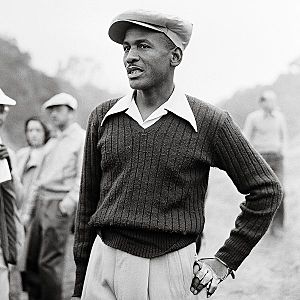Bill Spiller facts for kids
Quick facts for kids Bill Spiller |
|
|---|---|

Spiller at a tournament in the 1950s
|
|
| Personal information | |
| Born | October 25, 1913 Tishomingo, Oklahoma |
| Died | 1988 (aged 74–75) Los Angeles, California |
| Nationality | |
| Residence | Los Angeles, California |
| Career | |
| College | Wiley College |
| Status | Professional |
Bill Spiller (born October 25, 1913 – died 1988) was an American professional golfer. He played a very important role in ending unfair rules in golf. These rules stopped Black golfers from playing in major tournaments.
Contents
Early Life and Challenges
Bill Spiller was born in Tishomingo, Oklahoma. When he was nine, he moved to Tulsa, Oklahoma to live with his father. There, he quickly saw the unfair challenges that Black people faced in America.
Bill was a great athlete in high school. He was a star in two different sports. After high school, he went to Wiley College in Marshall, Texas. He earned a degree in education.
Later, Spiller moved to Southern California. He wanted to work as a teacher. But teaching did not pay enough money. So, he also worked as a railroad porter.
Starting Golf and Fighting for Fairness
Bill Spiller did not start playing golf until he was about 30 years old. A friend who was also a porter in Los Angeles challenged him to try the sport. Bill quickly became good at golf. In the 1940s, he started winning amateur golf tournaments that were only for Black players.
Challenging the PGA's Rules
In 1948, the PGA of America stopped Bill Spiller from playing in the Richmond Open. This tournament was held in Richmond, California. At that time, the PGA controlled professional golf. They had a rule that said only white players could join tournaments. This meant that even if a golfer like Spiller was very good, he could not play because of his race.
Bill Spiller decided to fight this unfair rule. He got help from a lawyer named Jonathan Rowell. Spiller and another golfer, Ted Rhodes, sued the PGA. They argued that the PGA's rule stopped them from earning a living in golf. This was against a law called the Taft–Hartley Act.
Right before the court case, the golfers agreed to drop the lawsuit. The PGA's lawyer promised that the PGA would stop its unfair rules. But the PGA did not keep its promise. Instead, they started "invitational tournaments." Black golfers were not invited to these events.
Getting National Attention
In 1952, the people organizing the new San Diego Open invited Bill Spiller to play. They did not know about the PGA's "whites only" rule. Spiller got help from Joe Louis, a famous former boxing champion, who was also invited.
When the PGA president, Horton Smith, stopped both Spiller and Louis from playing, Joe Louis told his story to a popular newspaper writer, Walter Winchell. The story quickly became big news across the country. Other newspapers also shared the story.
Once again, Bill Spiller threatened to sue. And once again, Horton Smith promised to change the rules. The PGA announced that Black golfers could play if they were invited. Some tournament organizers started inviting Black players. But the unfair rule itself was still in place.
The Rule is Removed
In 1960, Bill Spiller's fight got the attention of Stanley Mosk. He was California's attorney general and later became a judge. Mosk told the PGA that they could not use public golf courses if they kept their unfair rule. Most golf tournaments were played on public courses.
The PGA said they would only use private courses. But Mosk promised to stop that too. He also started talking to other state attorneys general across the country.
Finally, in November 1961, the PGA of America gave in. They removed the unfair rule they had put in place in 1943.
By this time, Bill Spiller was 48 years old. He had not started playing golf until he was almost 30. The rule was removed too late for him to have a long, successful career as a professional golfer. But his brave fight opened the door for many other Black golfers who came after him.
Later Life and Legacy
Bill Spiller had a wife and three children. Later in his life, he lived in a special care home. He had suffered two strokes and was diagnosed with Parkinson's disease. He passed away in 1988 when he was 75 years old.
In 2009, the PGA of America honored Bill Spiller. They gave him a special membership after he had passed away. They also honored Ted Rhodes and John Shippen. In 2015, Bill Spiller was added to the Oklahoma Golf Hall of Fame. His courage helped change golf forever.
See also
- Pete Brown (1935–2015), the first African-American to win a PGA-sanctioned tournament in 1964
- Lee Elder (1934–2021), the first African-American to play in the Masters Tournament in 1975
- Charles Owens (1932–2017)
- Calvin Peete (1943–2015), the most successful African-American on the PGA Tour before Tiger Woods
- Charlie Sifford (1922–2015), the first African-American to become a member of the PGA Tour in 1961
- Tiger Woods (1975–)
- United Golf Association
 | Toni Morrison |
 | Barack Obama |
 | Martin Luther King Jr. |
 | Ralph Bunche |

